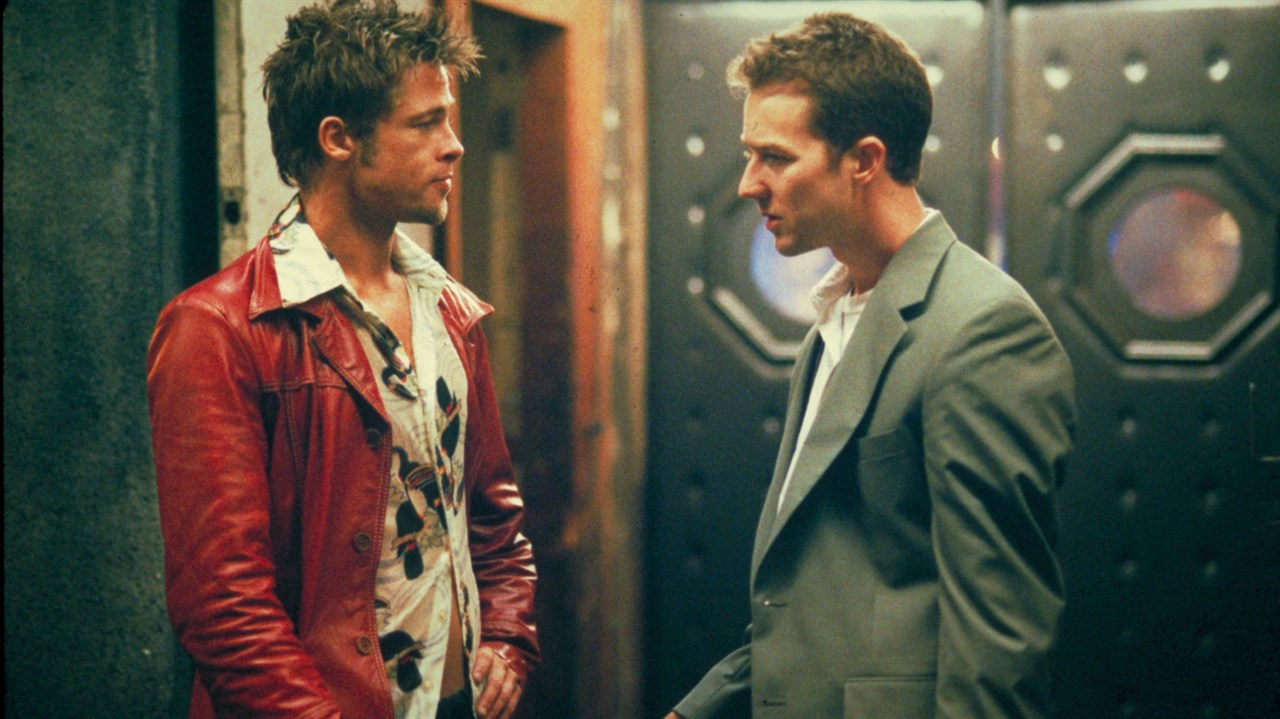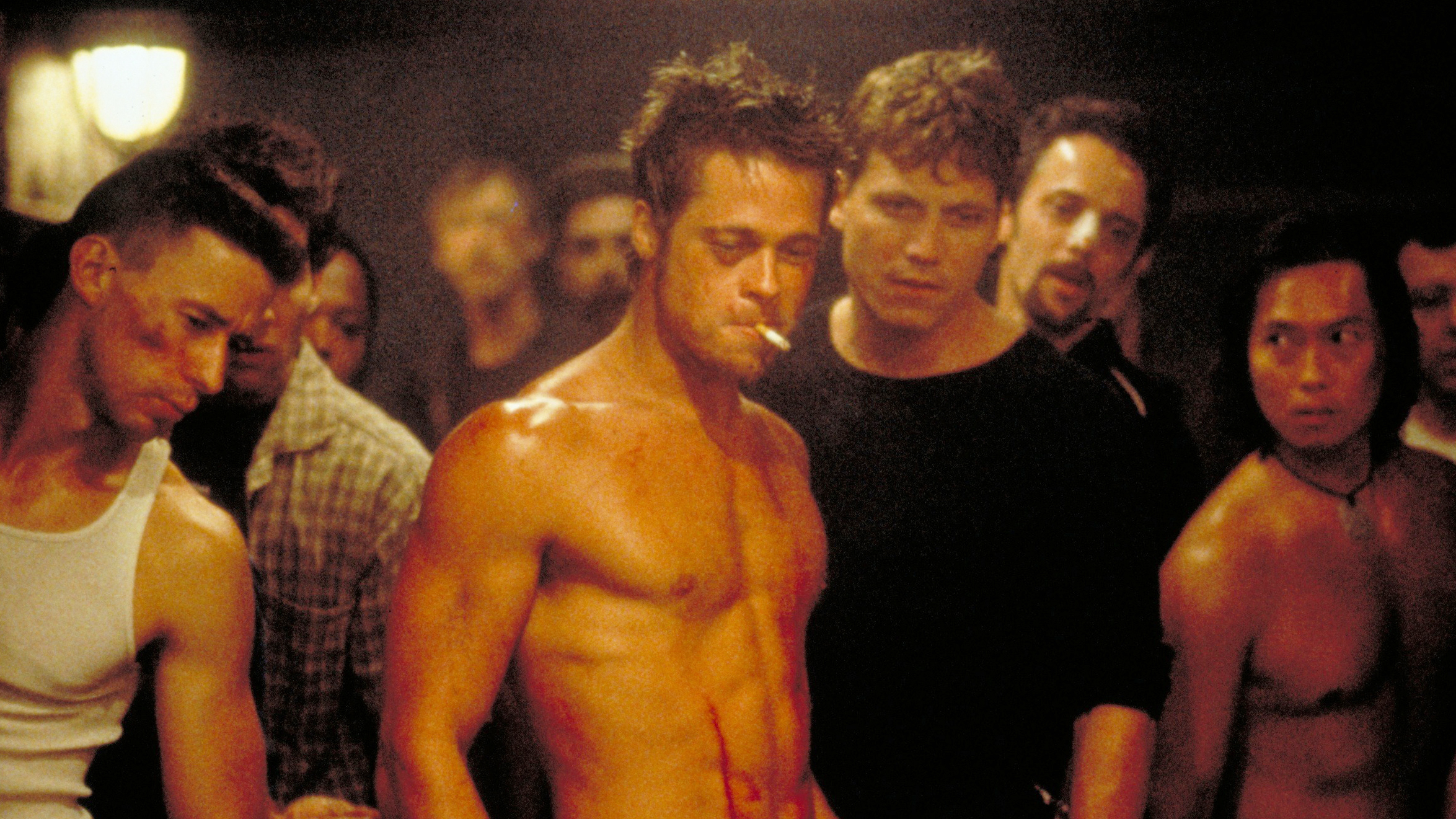Fight Club at 20: Why we shouldn't take David Fincher's masterpiece so seriously
Toxic masculinity, absurdist humour, and homoerotic overtones make Fight Club more than just a movie for edgy film students

The first rule of Fight Club is: don't admit to liking Fight Club.
The book and film have become shorthand for a very particular type of masculinity. Based on Chuck Palahniuk’s 1996 novel of the same name, Fight Club, directed by David Fincher, follows an unnamed narrator as he navigates his empty future. He’s frustrated and angry; positing as a cancer survivor just to feel something. Drowning in mundanity, he meets Tyler Durden, a man we later learn is a projection of the disturbed narrator. Played by Brad Pitt, Durden is impossibly cool and handsome. The narrator longs for Durden’s looks, his charm, the coolness he exudes, the fact that he can make a dressing gown sexy. After the narrator’s flat burns down, Durden educates him on the follies of consumerism and teaches him how to let go. They start “fight club”, a place where men punch out their hopelessness and agonies, before escalating to full terrorism.
As a teenager who was “into films”, I loved Fight Club, completely and unironically. However, growing up, taking a Film Studies BA and then MA, I started to resent it. Fight Club seemingly belonged to the men who would “debate” me in class – and, as a result, I stopped being able to enjoy the movie. Navigating the world as a woman and as a film fan meant that Fight Club, as it has for many women, became a signifier for the type of man I wanted to avoid. The evergreen tale of men’s frustration and need to centre their own identity at any cost is boring. The idea of hurt men committing violence and terrorism is far too realistic to stomach. But, despite hating the discussion surrounding Fight Club, with time, I’ve learned to once again love Fincher's masterpiece.
In 2019, the film’s commentary on consumerism and masculinity has set it alongside films like Taxi Driver and, more recently, Joker – films about men violently rebelling against their prescribed place in society. Fight Club’s scathing commentary about responsibilities, consumerism and men's uncontrollable anger has made it a handbook for edgy film students who are into "true" cinema.
Perhaps it’s so hard to enjoy Fight Club now because we just can’t relate to the perceived message it sends. Of course, millennials and Gen Z are increasingly rebelling against capitalism while fighting to save the planet. We all know society sucks, and it feels pointless, even cheesy, to say so. Plus, in 2019, the idea of having a secure job, an apartment, furniture, and brand name clothes doesn’t necessarily sound like a prison – it sounds like unachievable security.

Yet, there are many readings of Fight Club more interesting than “we live in a society”. The film, which intentionally kept the homoerotic overtones of gay author Palahniuk’s novel, has been the subject of queer readings. The bathroom scene, wherein Tyler Durden bathes next to the narrator and asks whether “another woman is really the answer”, serves as one example. The fighting, shirtless, least of all Brad Pitt’s perfect torso, adds to the homoeroticism. Durden splicing dicks into movies; the men fixing one another’s bowties; the men acting as a married couple; mentions of dildos and viagra and foreplay; the narrator watching Durden piss; Durden facing the camera to say, “nice big cock”. If nothing else, these teasings of homoeroticism serve to disrupt the idea that Fight Club is simply a handbook for cis, straight men. Of course, it can be read, too, as the blueprint for a society that exists entirely without women.
Fight Club isn’t the only film favoured by that edgy crowd. The Matrix, whose directors the Wachowskis both came out as trans women after its release, has enjoyed queer readings that have unsettled its “red pill” fandom. American Psycho, the film adaptation of Bret Easton Ellis’s 1991 Wall Street satire, gave a new dimension to readings of the book. The novel’s graphic, in-depth descriptions of violence against women made it hard to stomach, and its extensive lists and reviews of records made it tedious. Naturally, a surface-level reading will only reveal the misogyny of enjoying women being tortured. But a 2000 adaptation by director Mary Harron turned the story into more than a satire of Wall Street: it became a satire of toxic, competitive masculinity. While the book may be enjoyable – in short, not-too-immersive bursts – Harron’s take changes everything and makes it less uncomfortable to enjoy.
Sign up for the Total Film Newsletter
Bringing all the latest movie news, features, and reviews to your inbox
It’s Fight Club’s easy quotability that made it both instantly popular and unbearable. How many times can you see a screenshot of the narrator and Marla watching buildings explode soundtracked by Pixies on Tumblr before it becomes abstract? Separate from the film itself? Durden’s lengthy speeches with lines like “it’s only after we’ve lost everything that we’re free to do anything”, “this is your life and it’s ending one minute at a time” and “our great depression is our lives” make Fight Club easy to chop into sound bytes, and Durden’s speeches give Fight Club a mythic, religious quality. It’s easy to see how a generation of men came to see him as their leader. Like Trainspotting before it, it’s these sound bytes (“choose life”), that live on.
These films, though, are all more than their out-of-context quotes. I love Fight Club so much both because of David Fincher's direction, and because it’s funny. Its violence veers into absolute absurdity. Men expressing themselves by beating each other up is obscene. The narrator and Marla arguing about what cancers they want is silly. The escalating acts of rebellion are played for comedy at times. It’s filled with these funny moments. Pitt’s carelessness, his endlessly quotable one-liners, and Norton’s complete lack of fucks given, get funnier the more you watch it. The film has just been made abstract by years of hot takes.
Fight Club can also be read as a commentary on toxic masculinity. It’s tragic that the narrator can only really feel anything if he pretends to have cancer; that he doesn’t feel permission to have feelings unless he can act as if he’s dying; that a man can’t feel or seek true intimacy unless it’s through a spectre of himself. These men feel so trapped by their own masculinity and by their own lives that they can only find release by beating the shit out of each other and by causing mass carnage. Toxic.
Fight Club is far from perfect. But it’s not as bad, or as dangerous, as our collective memories often lead us to believe. As we spend more and more time on social media, it’s easy for a film to become synonymous with a certain type of fan, even before it comes out; Joker being the most recent example of a movie causing an online storm that sours people's opinions before seeing it. While Fight Club may be difficult to rewatch with an open mind after two decades of hot takes, sometimes, just sometimes, you might be surprised by what you find. I thought I liked Fight Club just because I believed, as a film student, I should. Then I thought that, as a woman, I shouldn’t. Neither is necessarily true.
Looking for something to watch? Why not check out the best movies on Netflix?
Marianne Eloise works as a freelance journalist covering film, TV, wellness, digital culture, money, and music, and a variety of other topics. You'll find her bylines in a variety of print and online publications, such as GamesRadar+, The Cut, The New York Times, Vulture, i-D, and Dazed.


